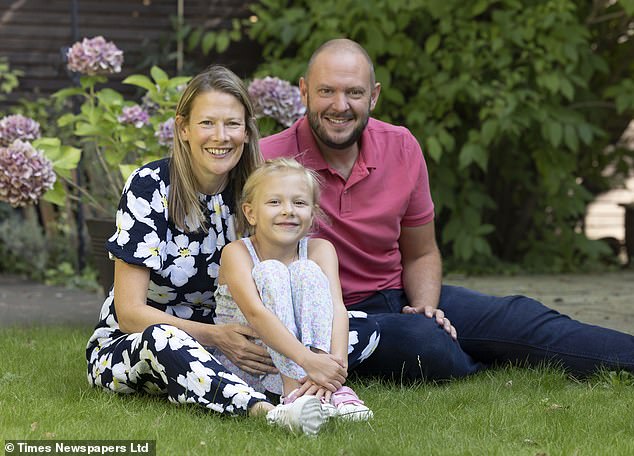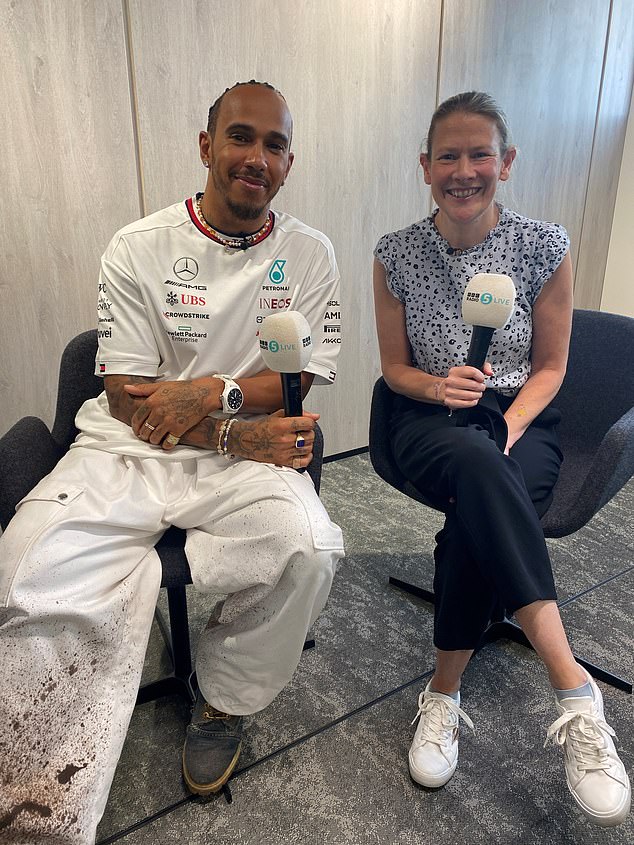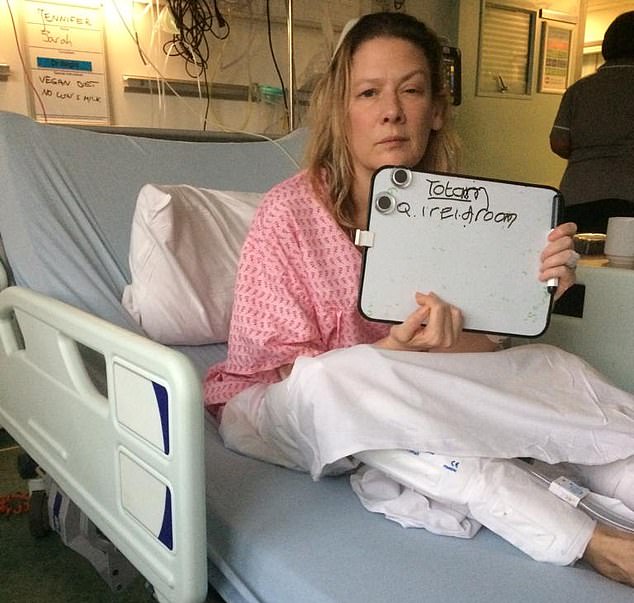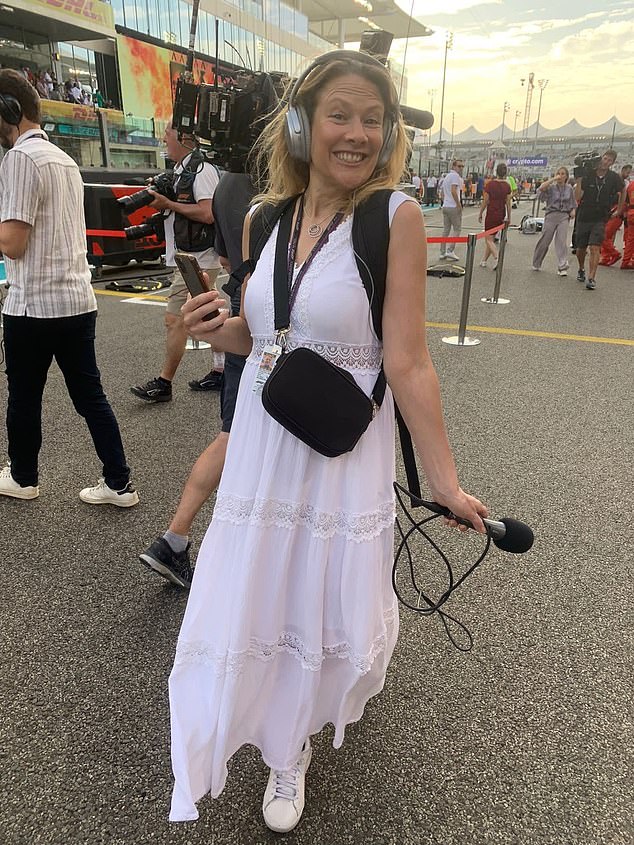How a coughing fit gave me a STROKE at 45 and I feared I’d never talk again: There’s an epidemic of young people having them… and now doctors are saying we all should know the warning signs
Jennie Gow had to muster every last bit of strength as she tried to scribble a sentence on the whiteboard that her husband Jamie had brought to the hospital to help her communicate.
“All I wanted to ask was ‘how are you?’” she recalls. ‘But it was painfully difficult. It took over 45 minutes.’
But just a few weeks earlier she had been on the track in Abu Dhabi as Formula 1 driver Max Verstappen claimed the 2022 championship title and another glamorous Formula 1 season came to an end.
But just after Christmas, Jennie, then 45, suffered a stroke that partially paralyzed her right side and, terrifyingly for one journalist, left her unable to speak.
“For the first few days, part of me thought I would never be able to talk again,” she says. “It was one of the loneliest and hardest things I’ve ever experienced.”
The presenter, now 47, who presents Radio 5 Live’s F1 coverage and reports on the sport on the BBC, has found her voice again. But not without struggle – with, she says, the world of F1 stepping up with remarkable kindness to support her.
These days, Jennie doesn’t look anything like someone who’s had a major stroke; only the way she folds her right arm protectively over her chest and the occasional hesitation in searching for a word are clues to the catastrophe that has befallen her.
“I’m lucky that I’ve recovered well, but there are things I still struggle with – even though I’m good at masking, so people don’t really notice,” she says.
Just after Christmas in 2022, Jennie Gow, then 45, suffered a stroke that partially paralyzed her right side and, terrifyingly for one journalist, left her unable to speak

Jennie, husband Jamie and daughter Isabelle. Today, Jennie looks nothing like someone who has had a serious stroke
‘It’s frustrating because I obviously want to be able to do everything I used to do at the same pace, but I’ve had to accept that that’s not possible, that I’ll never be completely 100 percent again – and that there’s a part of my brain that now is dead and can’t come back.’
It’s one reason why Jennie is speaking publicly about her ordeal, hoping to remind people how to diagnose stroke symptoms: the sooner a stroke is treated, the better the outcome.
“People often think that strokes are something that happens to older people or people with pre-existing medical problems, but that’s not the case,” she says. ‘If you look into it, you realize that there are countless fit, healthy people who suffer from it.’
This month the NHS warned of a surprise rise in strokes among younger Britons, with the over-50s increasing by 55 per cent.
This ‘is largely caused by lifestyle’, says Professor Deb Lowe, a stroke doctor at Wirral University Teaching Hospital, Merseyside.
‘We have an increasingly unhealthier younger population and nine out of 10 strokes are due to modifiable risk factors such as smoking, a sedentary lifestyle, poor diet and poorly controlled high blood pressure.’
These damage blood vessel walls and increase the risk of clots, blocking blood flow to the brain.
However, Jennie’s stroke was caused by a clot from the carotid artery in the neck and a tear in the blood vessel – caused by coughing. These tears (called carotid artery dissections) “are responsible for about 2.5 percent of strokes overall and 20 percent of strokes under 40,” says Professor Lowe, who is also medical director of the Stroke Association.

Seven months after her stroke, Jennie did her first on-air interview with former champion Lewis Hamilton as the F1 world stepped up with remarkable kindness to support her
But while alarming, Jennie’s also turns out to be a positive story.
She is back to work part-time, and just seven months after her stroke she did her first on-air interview with former world champion Lewis Hamilton.
“His team, Mercedes, was great,” she says. ‘Normally they give you ten minutes to chat, but they gave me 25 minutes – and ten minutes of that was off camera talking to Lewis; he gave me advice on how to get back in. My speech was still quite spaced out with long pauses, but it felt so good to be back.”
Jennie used her recovery to write a guide to the sport.
“It gave me a reason to get up in the morning,” she says.
‘I feel happy. I still pinch myself. Formula 1 is such a special place to work.’
It is also through motorsport that Jennie met her husband, Jamie Coley, 43, when he became her producer. They married in February 2012 and their daughter Isabelle was born in 2016.
Life since then has been a busy marathon that most working mothers experience – until the morning of December 29, 2022, after a festive period marred for Jennie by a bad bout of flu.
“I had such a terrible cough that I tested myself twice for Covid, but it was negative,” she says.
That morning she walked into the bathroom and the next thing she remembers is trying to grab onto the sink.
“That’s when it must have happened,” she says. “It’s like a shutter going up and down, so I only remember certain bits.”
Jamie, hearing a huge crash, rushed in and saw the terrifying sight of his wife collapsing.

Jennie says she had to ‘must up every last bit of strength’ as she tried to scribble a sentence on the whiteboard her husband Jamie brought to hospital to help her communicate

Jennie, now 47, who presents Radio 5 Live’s F1 coverage and covers the sport on the BBC, has found her voice again
“He called an ambulance, and Isabelle, thank God, went and got some pillows from the living room to put under my head,” Jennie says, her eyes filling with tears. Jamie and Isabelle, who was six at the time, accompanied Jennie as she was taken to hospital with a blue light.
She says, “My brain just wasn’t functioning. I couldn’t talk, I couldn’t communicate. It was so scary.’ Jamie was told his wife might not make it.
A carotid artery dissection, such as what Jennie suffered, can have a variety of causes – from road traffic accidents to sports injuries – “but also very rarely, due to extremely severe coughing,” adds Professor Lowe.
Its impact was graphically depicted on her brain scan, “which showed a gray area where the cells had died,” says Jennie.
Doctors gave her a clot-busting drug before she was taken to St George’s Hospital in south London for surgery to remove the clot. Fortunately it went well.
“I woke up in the operating room with Jamie by my side and I couldn’t understand what was happening,” she says.
She was placed in a side room where she had to face the reality of her physical limitations. “It’s like someone pulled the plug and you have to start everything over again,” she says.
‘I couldn’t really move my right side and I couldn’t communicate at all. It was quite terrifying. I think both Jamie and I immediately thought we were in trouble.”
As the fireworks rang in the New Year 2023, Jennie watched the clock tick and wondered if she would make a full recovery.
“I think that was the most scared I’ve ever been,” she says. ‘I know the doctors were concerned that I had lost some form of speech after the operation, which was not a good sign.’
She believes it’s thanks to one of her nurses that she finally found her voice. “She told me I had to get angry to find that energy,” Jennie remembers.
‘She kept asking if I wanted to say an O or an A. That didn’t work. One morning the nurse was with me at breakfast and said, “You’ve got this.”
‘And I did it, I said ‘Oh’. And by the end of the next day, I was able to tell her “thank you.” It wasn’t very understandable, but I knew I was on my way.’
Jennie has since undergone hours of physical therapy and speech therapy to regain full movement of her arm and her voice. “I was completely determined,” she says.
She did her first live reporting in August 2023 during the Grand Prix of the Netherlands.
“I was incredibly nervous when I entered the pit lane for the first time,” she says.
‘I wasn’t sure if I could cope with all the sounds and everything going on and still broadcast – but I just felt at home.
“I couldn’t talk as fast as I wanted, but at least I could convey something.”
These days, Jennie tires easily, but she considers herself one of the lucky ones: “that Jamie heard me fall, that we lived close to the hospital, and that I had such great nurses and doctors.” I have a lot to be grateful for.”
How to Read F1: Everything You Need to Know About Racing in the Fast Lane by Jennie Gow (£16.99, Penguin).
